#utsukushii kare analysis
Text
Utsukushii Kare master post
With Utsukushii Kare: Eternal becoming available on streaming in Japan and rumors of international streaming distribution on the horizon, I thought this might be a good time to do a roundup post of all of my meta writing on the series so far. There's quite a bit of it. Between the complexity of the psychological themes in this series and my capacity for hyperfocus, I ended up with a lot to say.
In case it doesn't go without saying, this post is subject to change as I continue to post on this topic.
The psychological paradoxes of Utsukushii Kare
This is a series of posts (the current plan is to write three installments) about what it says on the tin: paradoxical psychological dynamics in Utsukushii Kare. These are things about the characters that may seem contradictory at first but can be accounted for by digging deeper into some psychological concepts. These posts are focused on the series (both seasons) but will draw from the movie and from the novel and related stories when they illustrate points about the series.
Part 1: Covert grandiosity and finding status through idealization - A pretty deep dive into 1) the subtle ways Hira shows that while his self-image can be highly negative in some ways, in other respects he feels superior to others and 2) how by elevating Kiyoi’s status and humbling himself in comparison, Hira attains a different kind of status.
An addendum of sorts to part 1: Hira's parents and his self-defeating tendencies - Some guesswork about how Hira's parents could have contributed to his self-defeating personality, with some further discussion of specific self-defeating strategies he uses in his relationship with Kiyoi and elsewhere.
Utsukushii Kare through the lens of pursuer-distancer dynamics and related psychological concepts:
The pursuer-distancer dyad & how it applies to the world of BL - a primer on this psychological concept and how it applies to BL generally, with a brief reference to how this concept applies to Utsukare (also touches on Semantic Error and talks in detail about an example from To My Star 2). This one isn't super focused on Utsukushii Kare but is pretty de rigeur for understanding my UK posts on this topic.
Paradoxical roles; or, I think I finally figured out the pursuer-distancer dynamic in Utsukushii Kare - This post comes after some of the posts listed below but I recommend reading it first as this is really where (I think) I cracked the code on this aspect of the story.
Pursuer-distancer roles & attachment style in Utsukushii Kare, Part 1: Hira - In-depth discussion of Hira's role in the pursuer-distancer dyad, his attachment style, and his personality
Pursuer-distancer roles and attachment style in Utsukushii Kare Part 2: Kiyoi - In-depth discussion of Kiyoi's role in the pursuer-distancer dyad, his attachment style, and his personality
Re-evaluating pursuing & distancing in Utsukushii Kare season 1 - super detailed post working out my thoughts about pursuing and distancing in season 1
On the way Sakai Mai (the series' director) uses seme left, uke right framing and its significance in BL and other Japanese media:
Using an example from the s2e1 with the girl who hits on Hira at a party (via a reblog of a gifset from @nanons)
On the way Sakai flips Hira's and Kiyoi's position in the frame in two versions of the same scene and what it tells us about its significance
How the persistent/cute trope plays out in Utsukushii Kare season 2, plus related overanalyses of the big season 2 finale kiss:
The persistent and the cute (how "persistent" and "cute" are code words with specific meanings in BL/yaoi/other drama and manga genres/Japanese culture more broadly)
Analyzing the season 2 finale kiss in light of seme left/uke right framing and the persistent/cute trope (in a reblog of a gif post by @nanons)
Reblogging @bl-bracket to lobby for the season 2 finale kiss, with more overanalysis
Fragrance nerd discussion:
This bittersweet fragrance - on the significance of osmanthus/tea olive in Utsukushii Kare season 2, with additional information on the possible significance of the fragrance of osmanthus and perfumes that are either osmanthus soliflores or feature prominent osmanthus notes
Posts on specific season 2 episodes:
initial thoughts about S2e1
Additional (informal) thoughts on s2e1
S2e1 rundown
Hira's incongruous/misaligned affect at the end of s2e1
S2e2 rundown
on S2e2, including pursuer-distancer dynamics and seme left, uke right
Utsukushii Kare S2E4: “face me straight on” (mostly discussing relationship dynamics pointed out in topic-specific metas)
on Utsukushii Kare: Eternal:
Kiyoi and Anna: on Kiyoi’s friendship with Anna and its significance for his personal growth
#utsukushii kare#utsukushii kare meta#utsukushii kare analysis#utsukushii kare season 1#utsukushii kare season 2#utsukushii kare 2#utsukushii kare eternal#utsukushii kare: eternal#hira x kiyoi#japanese bl#jbl#my beautiful man#psychology of bl#pursuer distancer dynamic#attachment theory#attachment style
184 notes
·
View notes
Text
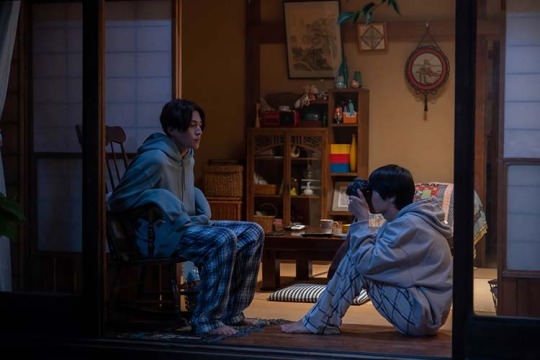
In Defense of Hira - A textbook case of C-PTSD caused by Childhood Abuse and Neglect
In a lot of the shows that I watch, especially with teens or young adults relating to trauma, or any genre really, there’s always a playful question on my mind: where are their parents? However, at this point in show, it’s becoming so much more apparent that the lack of support Hira received growing up, is fundamental to the way that he sees himself and his position in the world around him. So much so that as much as I want to joke about Hira being as dense as a stone wall, I find myself becoming increasingly uncomfortable in how much my own trauma and reactions to isolation mirror Hira’s.
Symptoms of complex PTSD
Feelings of worthlessness, shame and guilt.
Problems controlling your emotions.
Finding it hard to feel connected with other people.
Relationship problems, like having trouble keeping friends and partners. (Source: NHS)
How was Hira Traumatized?
He was left to his own defenses at an early age and had to fend for himself. Just because they provided him with a house and money for food doesn’t mean they took care of him. He was also bullied for a speech impediment and isolated by his peers as a result. He’s probably never had anyone listen to him closely or had close emotional or physical relationships in his life. Extended periods of neglect in childhood and then more intense isolation later on is extremely damaging.
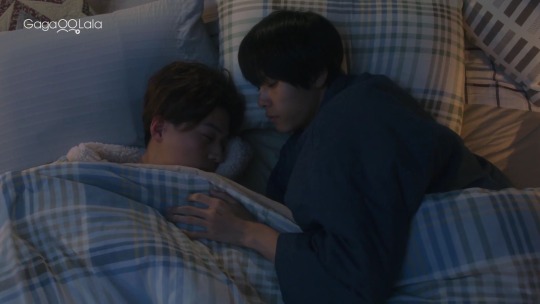
Trauma manifests differently. Before therapy, it was really difficult for me to wrap my head around the fact that I wasn’t actually invisible to friends and family. It took a quite aggressive and embarrassing event, (now funny and touching really) for me to understand that if I deviated from my own patterns or if I disappeared or didn’t contact people for hours that people would actually miss me or think about me. I went out and watched a movie after an event, and told one person through text. After the two hour movie, I turned my phone back on and found 30 missed calls. My mother had informed me that she had called the police and that the principal had formed a search party for me. My face was plastered all over Snapchat by my classmates.  I was mortified by what I believed to be a waste of resources and time on my behalf. Such a loud display of love and even then all I could think about was hiding away and making myself smaller. I wasn’t even decent enough to acknowledge the pain, worry, and fear they felt at the thought that someone they loved went missing. It took multiple years later: a very a tentative mother and aunt, very involved teachers, mentors and friends plus therapy for me to stop feeling like a ghost. To get out of my own head and stop trying to fade in the background as a coping mechanism. After being abandoned by his mother to live alone in a house so she could be with the family she wants, after being isolated by his classmates for having a stutter all throughout high school, only one person knocked loudly enough at the door attached to the fortress Hira built in his mind to cope with his trauma. Kiyoi.

That mental fortress is why Hira is alive today. It kept him safe when he had to sleep in the dark alone as a young boy when he had to cook his own meals. His social ineptitude is due to years of isolation and degradation by those around him. He wasn’t deemed worthy enough by his own mother to be taken care of. Yet Kiyoi loves and sees him. Kiyoi says his name and holds his hand and kisses him and suddenly Hira is solid mass. Not a shadow on the wall or the useless child not worth keeping. He becomes slightly more than nothing. In Hira’s mind he becomes a pebble. Sigh. Well it’s a start. But it’s not enough. It’s gonna take a real miracle for Hira to overcome years of trauma and see himself as a human being. I believe in him though. He’s so brave. No like really though, some of the shit he says is so cringey it takes real guts. Kiyoi is not going to give up on Hira anytime soon he’s too much of an exhibitionist for Hira and a freak (endearingly). Also, Hira is obsessive and intense, so they’re a perfect match.
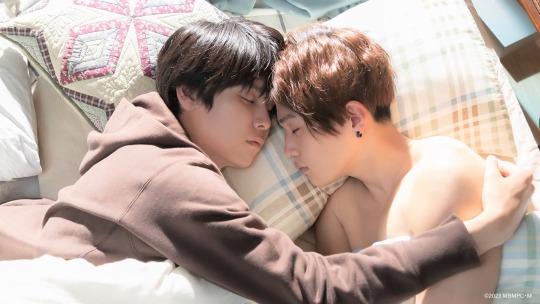
He just needs proper counseling and a bit of time. I’m rooting for them.
#My Beautiful Man#my beautiful man 2#utsukushii kare#utsukushii kare 2#hira x kiyoi#kiyoi sou#Hira#show analysis#review#childhood truama#tw cptsd
197 notes
·
View notes
Text
things I should be doing: literally any of the several tasks I need to get done
things I am doing: rewatching utsukushii kare
#still one of the best bls of all goddamn time#show of the year (2023) for me! and maybe 2024 too idc#I’m trying to get my analysis written out but it requires a rewatch first lol#utsukushii kare#b.txt
22 notes
·
View notes
Text
WKA Gay Analysis Assembly, Part Two
Well, it finally happened. My first Gay Analysis Assembly Post refused to edit for me. So I guess it's time to start a Part Two for all the new essays that I have been writing!
Please check out Part One here, it contains essays on: Utsukushii Kare, Moonlight Chicken, Bed Friend, Our Dining Table, Our Skyy 2, Step by Step, La Pluie, Cupid's Last Wish, Be My Favorite, My Ride, Only Friends, I Feel You Linger in the Air, Shadow, Last Twilight, and The Sign
Unknown
Episode 6: Breakdown Breakdown
Episode 7: Return Breakdown
Episode 8: Losing My Mind
Episode 9: Parallels
Dead Friend Forever
Dead Friend Forever: Episode 5
Power Dynamics in Dead Friend Forever
Dead Friend Forever: Squicks and Triggers Ep 1-8, Ep 9, Ep 10, Ep 12
Cooking Crush
Cooking Crush, Episode 8
Body Language in Cooking Crush
Love in the Big City
Part One: Two Friends Diverged in Emotional Sincerity
Part Two
Love for Love's Sake
Symptoms of a System Error: Manifestation of Depression in Love for Love's Sake
Kiseki
Kiss-eki: Dear to Me
#kiseki: dear to me#love for love's sake#love in the big city#cooking crush#dead friend forever#unknown the series
44 notes
·
View notes
Text
✨2023: A Summary✨
Post your most popular and/or favourite edit/gifset/analysis for each month (it’s okay to skip months!)
Tagged by @dribs-and-drabbles, thanks dribs! It's kind of fun to go back and see what I was on about at various points this year.
January
This blog was a mere bebe this time last year and I hadn't started posting anything substantial yet, so nothing of note here.
February
most popular — Making fun of Hira in Utsukushii Kare 2 (affectionately)
favorite — Praising Moonlight Chicken's character writing
March
most popular — The Glory does revenge right
favorite — Whining about people using the friends to lovers label wrong
April
most popular — Celebrating Queen Ae Ri from The Eighth Sense
favourite(s) — Making sure people understand Ji Hyun is a drama dork, helping to kick off the most batshit week of discourse in T8S fandom, and of course the first (of many) appreciation posts for Porsche's sweater
May
most popular — On Step By Step removing a scene critiquing BGP because of fan outcry
favorite(s) — 10 Things I Love About WDYEY and 10 Things I Love About Khun Chai (please watch them if you haven't yet people!)
June
most popular — Having a ball with King the Land
favorite(s) — Breaking down Pat's effect on Phupha in Our Skyy 2, the complexity of family trauma in Our Dining Table, and Jeng's reaction to his failed confession in Step by Step (ugh remember when this show was good). And of course this was the month that the La Plue meta round up was born.
July
most popular — Bitching about romance discourse (it was about King the Land at the time but it's quite widely applicable lol)
favourite(s) — Hysterical praise for La Pluie's conflict writing, kudos for Be My Favorite's character work for Kawi, breaking down where Step By Step went wrong
August
most popular — Ah the good times when we were still so amped about Only Friends
favorite(s) — Every moment of the My Ride rewatch, great moments in subtitlery from Laws of Attraction, and praise for Sing My Crush
September
most popular — That one time I actually liked a Mew thing in Only Friends
favorite(s) — Trying to get y'all to watch Love in Translation, comparing Someday or One Day and A Time Called You, clarifying the differences between Boston and Brian Kinney
October
most popular — Boston and Nick my beloveds (it would be shocking if they didn't make this list they are responsible for many of my most popular posts)
favorite(s) — A couple I Feel You Linger in the Air breakdowns: why the romance works despite being underwritten, and Fong Kaew's excellent character arc
November
most popular — Goofing on the unseriousness of Kiseki: Dear to Me
favorite(s) — Breaking down how the writing choices in Only Friends sent toxic messages and final thoughts on the IFYL finale
December
most popular — Japanese BL starter pack
favorite(s) — Simping over Mohk simping over Day in Last Twilight, yelling about Cherry Magic Thailand, kicking off bl superlatives 2023
--
In addition to all the people dribs tagged that I am double tagging because I want to see your answers (@wen-kexing-apologist @grapejuicegay @btwinlines @twig-tea @rocketturtle4 @waitmyturtles @telomeke and @respectthepetty) I am adding some other folks I know wrote/created a lot this year because I'm curious what stuck with you most: @bengiyo, @ranchthoughts, @jemmo, @chickenstrangers, @chicademartinica, @slayerkitty, @my-rose-tinted-glasses, @colourme-feral, @blmpff, @liyazaki, @wanderlust-in-my-soul, @troubled-mind, @benkaaoi.
37 notes
·
View notes
Text
I definitely have a big Bad Buddy meta hangover (I’m so. wiped. out. from writing.), but I HAVE to write something about Utsukushii Kare S2E3, because: IT WAS GREAT. It also brought up a memory I had from my youth that I want to use as a comparison.
I mean, first, the tables are turning. Hira and Kiyoi are both still narcissists, but: we’re seeing Kiyoi grow! He’s growing into his love and his needs.
Hira, on the other hand.... his narcissism just won’t budge. He DOESN’T WANT TO UNDERSTAND KIYOI. I mean, at least he was able to verbalize it! But his narcissism is SO STRONG that he’d rather live in the world of his OWN MAKING, than to see Kiyoi for the real man he is. Is Hira afraid of discovering Kiyoi’s imperfections? What is it about this addiction to deification?
Damn -- it is twisted, but I am loving seeing this process wind its way out. I know I’ve been wondering in the back of my mind: how the HELL does Hira have the TIME to stalk Kiyoi at his shoots? Aren’t you a busy college senior? Couldn’t Kiyoi just tell Hira to stay away? (Although I think that’s where their narcissism comes to parallel each other, maybe -- Kiyoi might like some of the fan attention from Hira, just not ALL of it, all of the overwhelming time.)
Anyway -- UK S2E4 looks amazing. And here’s the comparative memory I want to share:
When I was in my youf (like very early 20s in college) (yes I know many of you are in that category) (please enjoy every minute of your 20s) (but also aging is WONDERFUL so please don’t dread it) (#oldmomadvice), I dated a guy who was much older than me, like more than 10 years older. And I was me, a young lass, a very overprotected Indian gal on my own for the first time.
I dated him with NO INTENTION WHATSOEVER of EVER introducing him to my family. My family had zero knowledge that I was dating anyone, let alone this guy. My reality was that my family would and could never know I was dating him. In the back of mind, I could not at all reconcile that he was ever feasible to bring home.
When we broke up, he brought this up. He said that I valued my family more than the relationship.
At the time, I really couldn’t understand what he was talking about. It was just my reality that I dated guys without my family knowing. It was the only way I could have any sort of “normal” romantic engagement.
And now I can see what he was getting at. I was actually being narcissistic. Now that I’m married, I can ask myself: how could I *not* incorporate someone I loved into EVERY aspect of my life? Even if it wasn’t feasible to introduce him to my family -- at least I could have involved him in the conversation about WHY the timing wasn’t right, or even might never BE right. And it was also a value proposition: ultimately, I valued my family’s happiness over his, and honestly, my own happiness, too. I valued the risk I faced in upsetting my family FAR MORE than I valued the risk of upsetting MYSELF, AND my boyfriend. I couldn’t see any of this at the time because of my relative immaturity. My family had taught me that their happiness came first. But -- while the relationship had many problems -- he was right on this issue.
I think Hira is there, too. I think Hira feels a NEED to deprecate himself. He’s tremendously insecure. AND he’s a narcissist. His only reality that HE can understand vis à vis himself AND/OR Kiyoi is that he’s the lower.
And Kiyoi keeps, keeps trying to lift him, to get Hira to meet Kiyoi at Kiyoi’s level. (As usual -- @respectthepetty NAILS THIS in their analysis of the positioning between Hira and Kiyoi.)
And Hira is just like... naw. That’s not a reality that I understand -- and I’m not even going to TRY to understand it (?!?!?!?!).
Hira! CLAP EMOJI. I want to say to the boy: GET. IT. TOGETHER! Oooooh, if I were your mooooommmm. I’d haul you by the shirt collar to apologize to Kiyoi and like, chill on the cooking and shit, and just get you two a six-pack and watch some movies or something together! JUST RELAX, AAAHHH.
(I’m so burnt out, ha! I’ll get my energy back to write smarter reviews soon.)
#utsukushii kare#utsukushii kare season 2#my beautiful man#my beautiful man season 2#utsukushii kare meta#my beautiful man meta#hira x kiyoi#kiyoi x hira
41 notes
·
View notes
Text
Best Soundtracks in BL
No one asked me for this but I’m doing it anyway. If you’ve read any of my music analysis posts, you will know my criteria for a good soundtrack. Anyway the links are to the MDL page for the shows:
Japan:
Old Fashion Cupcake - watch on Viki
Utsukushii Kare aka My Beautiful Man - watch on Viki or Gaga
Minato Shouji Coin Laundry - watch on Gaga
Thai:
Not Me - watch on Youtube
Cutie Pie - watch on Youtube
The Eclipse (still airing) - watch on Youtube
Korea:
The Devil Judge - watch on Viki
Semantic Error - watch on Viki
Light on Me - watch on Viki
China (censored):
Guardian - used to be on Viki, now grey
The Untamed - watch on Netflix or on Viki
Word of Honor - watch on Neflix or on Viki or on Youtube
#this is not a comprehensive list#i chose my top 3 soundtracks for each country#but they are not the only good sountracks#old fashion cupcake#utsukushii kare#minato shouji coin laundry#not me the series#cutie pie the series#the eclipse the series#the devil judge#semantic error#light on me#guardian the series#the untamed#word of honor
34 notes
·
View notes
Note
What twenty shows are you watching…how are you not loosing the plot of each show omg I would have to go back and watch the series all over again. Twenty so many lol.
So! I did mistype. It's only going to be 19 shows. I forgot Senpai ended today.

That's my current MDL list and add to it Love In The Air starting next week and two Vietnamese BL, Memories and Want to See You.
I don't seem to have issues with mixing up plots. I do struggle with character names sometimes (having Kuea and Nuea at the same time was rough and right now there's a Kim and a Khim and it's hard and there's literally going to be two PayuRain couples soon and that's gonna be wild.)
Ironically I also never rewatch episodes while the show is airing. My only exception for this was Utsukushii Kare. I just... I remember shows. I know what's happening in each one because I tend to do a lot of analysis. The less analysis I do for a show, the more likely I am to lose track of something.
But I do tend to have a good memory for which show is which and what they're doing and the plot points. Heck, all I need to do to remember shows is typically look at the title and, rarely, the main actors.
I mean, I've watched 339 dramas on MDL (and more that aren't listed) and I can genuinely remember most of them based on the title.
#bl drama#bl series#francis is slightly mad#yeah i watch a lot#and next week i go back to work#that's gonna be wild
32 notes
·
View notes
Text
jason didnt tag me i just dgaf @gaiaxygang ... you should tag me idc
Current time: what like time here? 2:41am
Current activity: well if you look at the time. then. you can tell that it's "thinking about if i should go to sleep or not" (i dont want to. i should. i need to be awake by 8am)
Currently thinking about: be my favorite. i could talk about that show for 6hrs straight and just be getting started
Current favourite song: well my CURRENT favorite songs (my ult fav songs are lower nulut and bitter roce) are night out krist, my ecstasy bright, zero talking harumaki gohan, pamela balloon
Currently reading: snow country yasunari kawabata, a book on digital photography, like 3 books i have on literary theory, and "autoethnography a guide to qualitative research" oh and 2gether i guess
Currently watching: so much. my currently watching numbers are over 30+ ....... however if i'm being REAL about it ? i'm watching viu shadow, f4 thailand, an eye for an eye gmmtv, and a bunch of gmmtv reality shows (brightwin inbox, armshare eps, friend drive, come and join gun, taynew meal date, etc)
Current favourite character: hira kazunari utsukushii kare changed my life last year and has not left my mind. he's why i borrowed a book on photography
Current WIP: pisaengkawi og timeline ficlet, 3.6k todplathong from my baby bright, analysis of parenthood in gmmtv shows, a long post on jittirain shows, and "I HATE CONSUMING MEDIA" the worst unfinished doc i have that i plan on actually finishing. oh and offgun
@cartooncommie whenever you come on. do it.
1 note
·
View note
Text
Hira's parents and his self-defeating tendencies
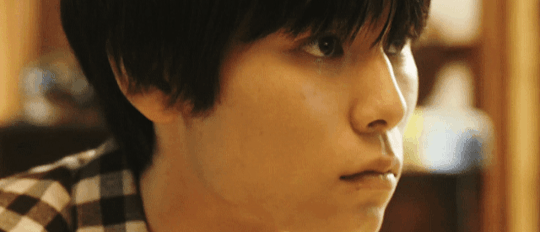
I was talking to @sorry-bonebag and @wen-kexing-apologist about what role Hira's parents might have played in creating the weirdness he displays throughout both seasons of Utsukushii Kare & Eternal. I started writing a response and it got too long and, well, now it's a post.
Before I talk about Hira's parents and the tendencies in him that they helped to create, I want to note that family of origin is just one of the influences that form us as people. Parents and caregivers have a huge influence, as do other family members. But so do peers. The bullying about his disability that Hira experiences nearly constantly is one of the biggest influences on his personality.
Hira's parents appear extremely briefly at the very beginning of the series. His mom fusses a bit about him being on his own and his dad is very "he has to take care of himself sometime" about it. We know they took him to specialists for his dysphemia, bought him his camera, etc.
Their departure is a show thing, by the way, and isn't present in the novel. In the novel they continue to live with him through high school and, if I remember correctly, part of college. But they don't play a big role in his life. The main things that happen involving them are either instances of Hira hiding things from them (or attempting to) or instances of his mother briefly, sporadically, having a big burst of worry about him. It would make sense if the show version of his parents were the same way aside from the leaving-him-to-live-alone part of things, though that’s not shown.
The rest of my thoughts are largely headcanon since I’m working backwards from his personality to guess about his formative years, but they match up with the little bit that’s shown in the series and how his parents are in the novel. I see Hira as having a self-defeating personality in a lot of ways. The typical etiology of this kind of personality (the set of conditions that lead up to it) is supposed to be a rather deprived childhood that is punctuated by occasional bursts of parental attention when the child is seen as in crisis somehow (or when they attract attention in other self-defeating ways, like intentionally getting in trouble).
This reminds me of something Nancy McWilliams writes about in Psychoanalytic Diagnosis, attributing the idea to someone named Emmanuel Hammer: “a masochistic person is a depressive who still has hope.” [I should note here that “masochistic personality” is an older term for self-defeating personality that is not meaningfully correlated with masochism in a sexual sense. I think that, despite how he might appear at first glance, Hira actually isn’t sexually masochistic or submissive. I have a whole mostly-written post about this that I hope will see the light of day eventually.] In other words, whereas the background that creates a depressive personality involves deprivation that's intense enough that the person gives up on the possibility of receiving the love they need, the self-defeating personality has had enough success with occasionally getting their needs met that they keep trying.
If that’s what happened with Hira, it would be consistent with what we see of his parents in the series. We know they pulled out the stops at certain points when it comes to his dysphemia. Anyone who’s a parent can tell you how hard it is to get a good specialist to see your kid, even when they have some kind of glaring issue and you have decent healthcare access overall. The fact that they managed to get him in with a specialist is notable all on it own. (I actually have some stressful phone calls I need to make today in a similar vein, seeking specialist help for one of my kids.) They also spent a lot of money on a DSLR for a young kid. And yet they’re OK with letting him live alone and after that point remain very hands-off. It also seems like despite the attention they paid to his dysphemia during that one period, by the time of the series they’ve totally stopped trying to support him about it.
Basically, I think his parents are largely neglectful (emotionally rather than materially) but that every so often, they freak out and pay a bunch of attention to him because they perceive him to be in need of rescuing. When he was young, he probably appreciated the attention when it happened, but at the time of the series he gets those needs met in other ways and/or displaces that need for attention onto Kiyoi. The idea of seeking attention in this way maps especially well onto his relationship with Kiyoi, because he seeks Kiyoi’s attention and approval through exactly the sort of strategies typically used by people with self-defeating personalities. Here’s McWilliams again:
Reik (1941) explored several dimensions of masochistic acting out, including (1) provocation [she refers to a previous anecdote about a woman who feared angry outbursts by her partner because of experiences with her father; she would act out in ways that antagonized him in order to “get it over with”], (2) appeasement (“I’m already suffering, so please withhold any further punishment”), (3) exhibitionism (“Pay attention: I’m in pain”), and (4) deflection of guilt (“See what you made me do!”).
I can think of plenty of instances of provocation (the first type). Hira often does things he knows will make Kiyoi angry, and sometimes visibly relishes the negative attention.
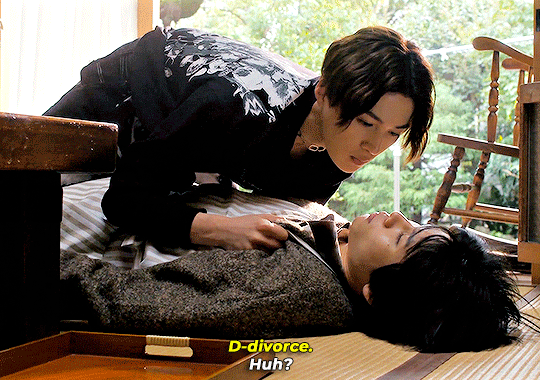
One good example is the scene in Eternal where he creates a totally avoidable misunderstanding by vaguely talking about how “a divorce is going to happen” because of an affair, which Kiyoi takes to be referring to their relationship and specifically, to Hira cheating. When Kiyoi rears back to punch him, Hira protests for a moment but then says being killed by Kiyoi is actually a longstanding wish of his. It turns out it’s Naho-chan who is getting divorced because her husband cheated. Hira could easily have spoken more clearly when he brought this up by using subjects in his sentences. When he first brings up divorce, Kiyoi says, “Who are you to decide on your own without me agreeing? What dissatisfaction do you have with me?”, which makes it clear he thinks Hira is referring to something involving him. Yet Hira continues to speak without subjects when he elaborates and says the reason for the divorce is an affair. He only clears up the misunderstanding after Kiyoi has lost all patience and is (legitimately!) freaking out. There's no way this isn't, on some level, intentional.
One version of appeasement (the second type of self-defeating acting out) that McWilliams talks about is criticizing oneself before others can do so. It’s no exaggeration to say that Hira talking himself down to Kiyoi is a defining characteristic of their relationship. There are lots of examples of this but a particularly classic case is his constant refrain about being a “pebble.” His invitation for Kiyoi to “Please hit me as much as you want” after their fight in season 2 is another example of appeasement.
It’s hard to pin down specific examples of Hira employing the third type of acting out, exhibitionism. It makes sense that it wouldn’t be, though. This is a very covert type of exhibitionism that doesn’t announce itself. I think you can observe it in subtle ways, though. For example, when Shirota dumps tomato juice on Kiyoi, a bunch of it gets on Hira as well. Afterwards, Kiyoi cleans the juice off of himself as best he can, seemingly as quickly as possible, and changes his clothes. But when he talks to Hira afterward, dried drops of juice are clearly visible on Hira’s face. Acidic juice on one’s face would probably feel uncomfortable, but he intentionally doesn’t wash it off. It’s like he’s wearing these stains as a badge of honor and proof of his mistreatment.
I think deflection of guilt, the fourth type, is less characteristic of Hira than the others. He tends to absorb guilt rather than deflecting it, blaming himself in a way that often takes the form of the self-critical form of appeasement.
I think it's worth noting that he also employs appeasement as a strategy in the hostile environment of high school. His biggest rule in school is to avoid attention as much as possible, so exhibitionism and provocation aren't acceptable options. (He does disobey Shirota in a way that could be considered provocation when the rift between Kiyoi and Shirota first starts to form, but I think that's more a case of overt rebellion.) We don't see him employ deflection of guilt, though his teacher does seem a bit more forgiving of his attack on Shirota given what he knows about Hira's experiences with bullying. But appeasement? When he can't avoid attention entirely, that is his go-to strategy. It doesn't draw much, if any, additional attention this way. He can demonstrate to people who pose a danger to him that he's not a threat and is ready to comply with their orders if it will allow him to avoid mistreatment. It's only when he finds a kind of vicarious strength in Kiyoi (see my post here for more on that aspect of Hira) that he starts to deal with the bullying in other ways.
So, yeah. Hira's parents initially formed these patterns in Hira, peers deepened them, and they came out in his relationship with Kiyoi. A big part of the shift that needs to happen in order for their relationship to last is for Hira to stop using self-defeating strategies to sneakily get his needs met by Kiyoi and start seeking what he needs openly and assertively.
Maybe now would be a good time to brush off those other in-progress Utsukare posts and try to finish them off while I have a bit of momentum, huh?
By the way, if you’re interested in my previous Utsukare posts, I have a master post here with links to everything.
#utsukushii kare#utsukushii kare meta#utsukare#utsukushii kare analysis#psychology of bl#psychoanalytic theory#self-defeating personality#hira kazunari#kiyoi sou#hira x kiyoi
59 notes
·
View notes
Photo



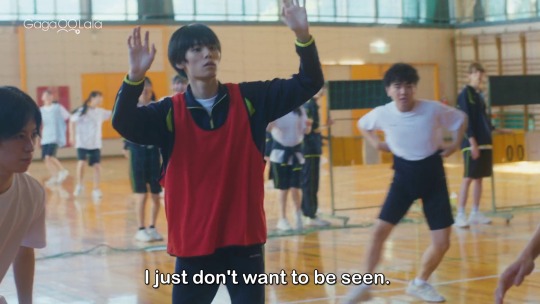
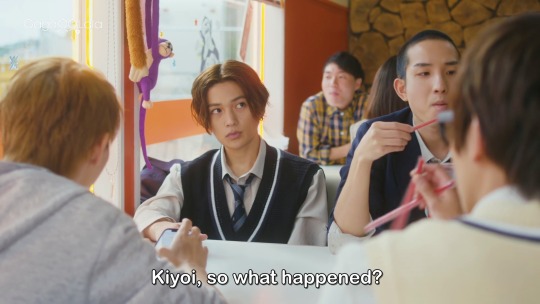


Hira doesn’t even contemplate the idea that someone could possibly speak to him or notice him (thus, his sheer shock when Kiyoi addresses him in the lab) yet he somehow unknowingly catches the attention of his crush, aka the hottest and most sought-after guy in school, howerver misguided and bullying that attention might appear at first glance, without being aware of it. Which makes it so rivetting and satisfying to watch because it’s so poignant - the self-depricating and stammering outsider finally finds someone who not only sees him but also watches him with with rapt attention and because Hira is so starved for it, as he’s never had anyone giving it to him except for his parents, he secretly relishes it.


And here comes the biggest and most delicious plot twist - it’s not Kiyoi’s friends who initiate the bullying (which is quite mild by dramaland standards), it’s him and he doesn’t start it out of revenge on Hira for spying on him like a creep or on a whim, but because the moment he opened his eyes in that classroom and saw Hira, he became attracted to him. It’s then when Kiyoi begins to look at Hira so searchingly as if he were trying to figure Hira out like some enigma he can’t solve.
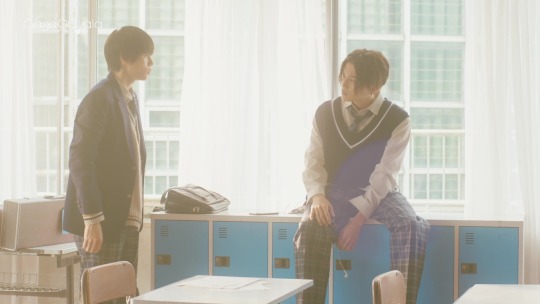
Kiyoi finds Hira interesting and is curious about him so he deliberately makes him into a shuttle as an excuse to keep him close and figure him out without explanations or suspicion. It’s pretty much the jdrama version of Gilbert Blythe calling Anne carrots because he lacked the maturity and courage to catch her attention and show her he fancies her in any other way. By the way, isn’t it strange and messed-up how a certain part of the audience has such a heavy expectations not only on characters in general and them being always mature, perfect, fuctional annd basically lack any sort of flaws, but especially on high schooler characters who are legally still children?
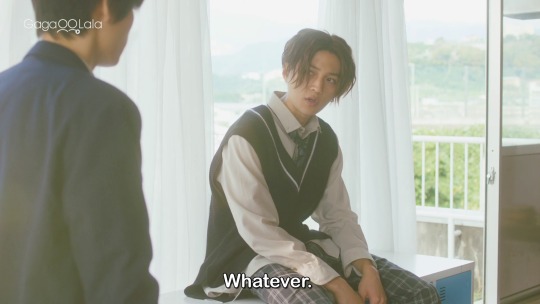
When Kiyoi says ‘whatever’ in the English subtitles, it’s a big translation shift because he actually says ‘I don’t get it (what you’re saying)’, basically telling Hira to explain himself better and keep talking because he is curious about his explanation. A lot of people diminish and misunderstand this scene by focusing only ony HIra secretly watching Kiyoi and Kiyoi calling him ‘creepy/disgusting’, instead the main focus is on Kiyoi being patient with Hira, interested in him and giving him the space to express himself, even prolonging the conversation, Most people at this point, ould tell Hira to not to bother them again without caring for his explanation and leave.


People don’t give personal information to someone they consider creepy nor do they initiate physical contact, instead they avoid individuals who make them uncomfortable. Furthermore, it’s 2021 and phone numbers are usually shared via bluetooth or dictated, not written down, especially not on bare skin. So Kiyoi first excuse was making Hira his shuttle to keep him close and his second excuse was telling him to call him because he wanted his number. People rarely say what they truly mean or they say it in an implicit, vague or ambiguous manner to protect themselves or others, that’s why it’s important to watch their actions because sentences without context mean very little. This applies even more to fictional characters.


Few dramas nowadays use the technique where a character looks at someone when the other person is not watching. On the other hand, Utsukushii Kare does it amazingly. Those 24 short minutes of episode 1 are packed with scenes of Kiyoi with his eyes transfixed on Hira while Hira is completely unaware of it and everyone else in the room looks at at Kiyoi or tries to catch his attention. The moment which illustrates this perfectly is when Hira looks for the money in his bag - when he stands upright, Kiyoi’s eyes are looking at his head, then after Hira bends down Kiyoi’s gaze follows him down and lingers on him until the other classmate begins to bully him which makes Hira stand up and, once again, Kiyoi look up at him. I love this scene because no one pays attention to Hira except for Kiyoi and Hira stands in the center of the classroom and becomes a center of Kiyoi’s focus, with Kiyoi being attracted to Hira like a magnet.


Also, it’s still too early in the story to make connection and assumptions like this, but Kiyoi literally put his name on Hira’s skin! Squeaaaaaaaaaaal!

329 notes
·
View notes
Text
I love utsukushii kare so much I’m gonna be SICK
#I LITERALLY CANNOT STOP TJINKING ABT THEM#AND WHEN I DO INWANT TO CRY SO HARD#LIKE RN YES I AM A LITTLE OVERLY EMOTIONAL ABOUT THEM.#i have another analysis thought thing that I want to post but every time that happens I have to fight through my emotions so that#the sentences I write actually make sense. do u get it#UGH BUT ALSO NOT EVEN JUST THEM LIKE. OKAY HIRA SPECIFICALLY BC HE IS LITERALLY ME LIKE IVE NEVER FELT SO SEEN IN A CHARACTER LOWKEY…#AND JUST THE FUCKING STORY. THE WAY IT TIES TOGETHER PERFECTLY#OR THE CINEMATOGRPAHY AND EVEUTJTJNG RFGJFUDUDGGGHHRHRGHHH I CANT YALL ITS SO BEAUTIFUL#(saw a really good edit yesterday and it’s not helping this brainrot)#anyway. just had 2 post abt it. thank u#utsukushii kare#b.txt
11 notes
·
View notes
Note
top 5 favorite shirts :D
Ooo I like this one, okay let's see...
Uea's Hawaiian Shirt in Bed Friend, Ep 4
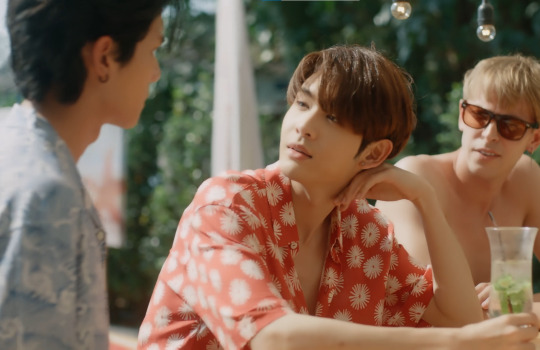
It's fun!
Phaya's Hawaiian Shirt in The Sign, Ep 2

gif from @ohshinytrinketsmine
It's even more fun! It has bunnies on it, cause Phaya is queer as fuck
Mhok's Fart Proudly Shirt in Last Twilight, Ep 2

screenshot from @hotasfahrenheit
We laugh but also the rest of the shirt is really important commentary directly related to the plot of Last Twilight I saw a good analysis about it, I apologize that i cannot find it. (edit: this was the post, it's from @dribs-and-drabbles! thank you @respectthepetty for sharing it with me)
Kiyoi's Hoodie in Utsukushii Kare 2
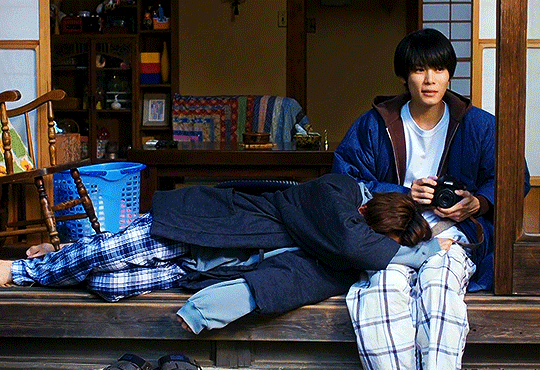
gif by @storge
Kiyoi looks so comfy cozy all the fucking time and I am jealous as all hell.
Dudes Shirt in Be My Favorite and Only Friends

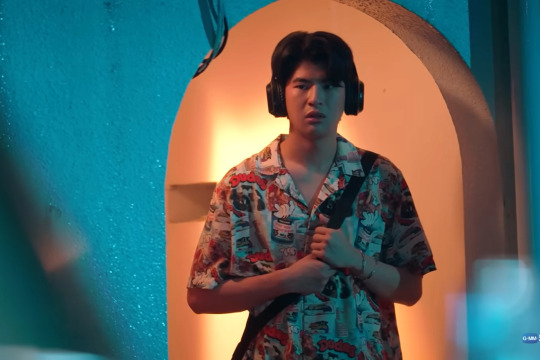
screenshots from @dribs-and-drabbles
Gayyyyyyyy
ASK ME MY TOP 5 OF ANYTHING BL 2023
#best in bl 2023#bed friend#the sign the series#last twilight the series#utsukushii kare#utsukushii kare 2#be my favorite the series#be my favorite#only friends the series#ask game
46 notes
·
View notes
Text
I drafted this huge ass content rich analysis on my phone but my post didn't get saved 😢😭😭
So please take my fav gif compilation [ all the gifs here are made by other people like storge ( a gif master who made some of them ) ] and a short summary of my emotions from Utsukushii Kare ep 3 and let me cry .

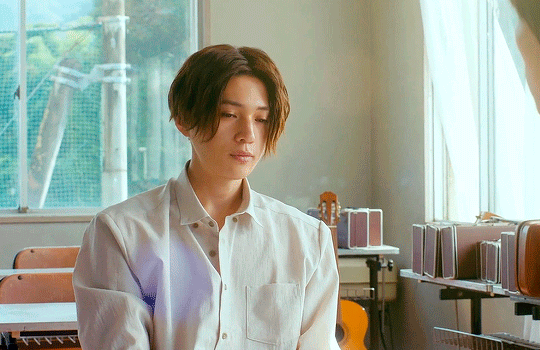
Top tier acting * chef's kiss 💋* He can't even believe that he can be this precious to somebody at first but then is so f******* happy whilst simultaneously saying disgusting .

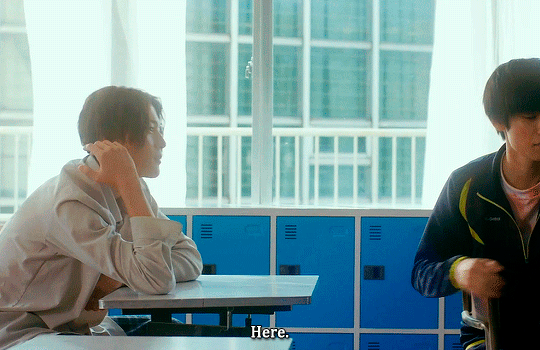
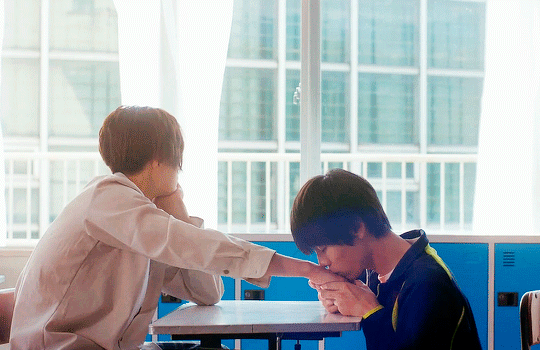
This beautiful boy just wanna be touched by Hira so bad . . .
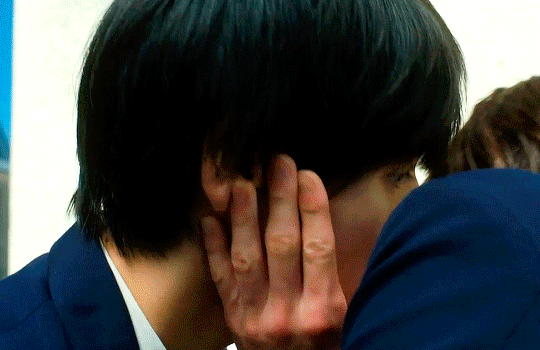
Yes , disguise it as a pitiful mercy kiss but we all know you wanted to , Kiyoi .
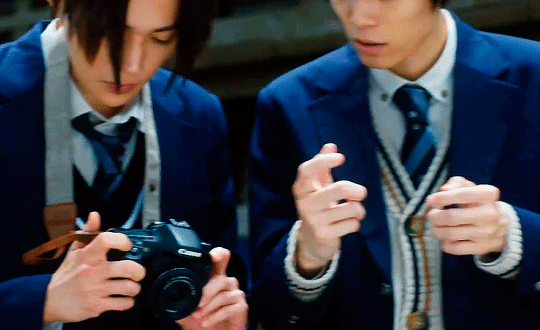
Let Kiyoi touch your most prized possession so he can enter that lonely world where only you existed .


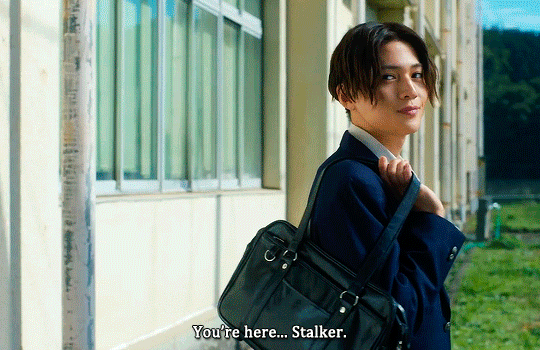
The evolution of stalker 😁
#美しい彼#my beautiful man#utsukushii kare#japanese bl#asian bl#asian lgbtq dramas#boys love#hira x kiyoi#riku hagiwara#yusei yagi
490 notes
·
View notes
Text
2021 BL Wrap Up - Top Trends
I keep a pretty detailed spreadsheet of everything I watch in BL each year but I don’t watch/track a whole lot of Pinoy stuff, please be aware it is not represented in this analysis.
TOP 10 BL TRENDS OF 2021
1. BL Gets Meta

We had a number of BLs this year self referencing, being cheeky about tropes, and using parody to get meta over yaoi roots, something that has actually never happened before in the genre. Gen Y, Absolute BL, Lovely Writer, Call It What You Want 1 & 2, Love with Benefits, and Fish Upon the Sky (started, then retracted, it was... odd) all did this. Several of them employed voice over and/or 4th wall breaking to execute.
I personally loved this, but it felt very teenage industry discovering itself and testing its limits. Also it’s pretty impossible to recommend these shows to outsiders, since they edge into incomprehensible if you don’t already know the genre, so this is also an odd kind of fan service.
2. BL Goes Soft
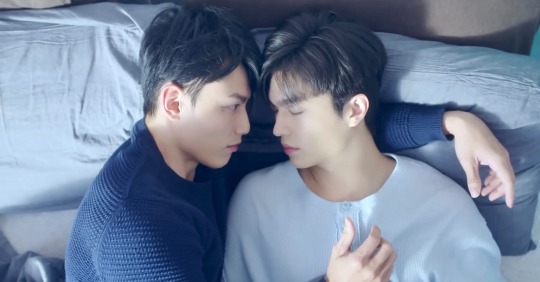
Pretty much everyone tried on softness in 2021 (mutual gentleness and care) even Japan (a real shocker, Kieta Hatsukoi). Perhaps it was reactionary, a hunt for comfort in troubled times, but it was so crazy that even Taiwan went there. Generally Taiwan prefers to push boundaries and rough it up a bit but they casually trotted out Be Love In House: I Do’s epic level of tenderness, See You After Quarantine?’s gentleness, and Love is Science?’s ultra modern queer domesticity as if they were no big deal. These were the soup dumplings of BL - soft, a little chewy, and full of comforting cozy warmth.
Thailand has always leaned soft (since Love Sick piloted in 2014) casual physical contact and affection, gentle touches, care, lingering glances, and cuddling have been part of their BL style, but they leaned into super squishy in 2021 with shows like Nitman, Y-Destiny, Golden Blood, Lovely Writer, Second Chance, and Close Friend.
Even China got a little soft with Word of Honor which no one expected and we are all surprised was allowed to happen. I mean there was a high low hug AND a shoulder lean and everything.
I really hope this trend continues and while I doubt Japan will ever go fully soft (their right back to emo with Utsukushii Kare), I have high hopes we might see softness leak more into Taiwanese and Korean BL.
3. BL Gets Domestic
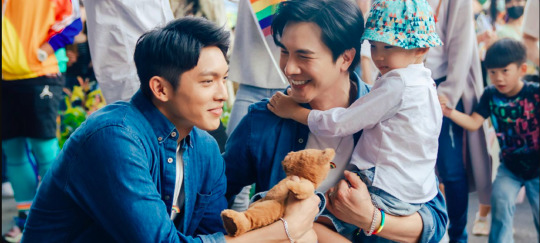
Thai BL has dabbled in family home life before, and when we are lucky we get reps of sweet domesticity (especially if the seme is a caring Dom - Solo, Dean, Leo, Sun, etc...). But it felt like we got way more than normal this year and of a more intense style with different countries putting unique stamps on it. This might be a side effect of C19 and it’s certainly something that suits confined spaces and a home setting (making it easier and cheaper to film).
I think the earliest rep we have for this kind of thing is Ai no Kotodama from Japan (2008). And there was a trickle of stuff from Japan and China for about a decade that dabbled in domesticity but none used it to drive narrative (Japan’s Does the Flower Bloom? from 2018 is sort of the culmination of this nascent form). Thailand first did it with 2016′s Grey Rainbow (this is the Thai BL THAT SHALL NOT BE NAMED - sry do not watch it).
But now we’re getting true windows into gay domesticity and family life, adopted kids and all. And our little gay family sometimes even gets to stay together. Some examples included:
Ingredients (Thailand)
Papa & Daddy (Taiwan)
Nation’s Brother (Vietnam)
Me Chon Dau Cao - Monster In Law (Vietnam)
Love is Science? (Taiwan - BL side plot in a het drama)
But others also have is as a core conceit, especially those set primarily in the home like Be Loved In House, To My Star, Still 2gether, See You After Quarantine? or even Golden Blood. It’s a trend I really hope continues and grows, so comforting.
4. BL Plays With Its Food
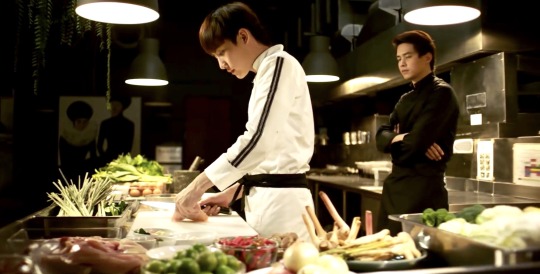
Basically prior to 2021 we had 3 BLs with food settings: 2019′s I Am Your King 2 from Thailand and 2020′s Pinoy offering My Day and Taiwan’s Craving You. (And a few Korean microfilms.)
In 2021 we got a lot more. Even if it didn’t all entirely take place in a cafe or restaurant that setting played a significant role.
To My Star (Korea)
Peach of Time (Korea/Thailand)
Evening Cafe (Thailand)
Love Area (Thailand)
You Are Ma Boy (Vietnam)
My Lascivious Boss (Vietnam)
Bite Me (Thailand)
The Tasty Florida (Korea)
My Sweet Dear (Korea)
Apparently chefs are the new engineers. There were also professional chef/barista/waiter characters in series that were not set in the industry like Ingredients, Brothers, and My Mate Match. And more to come in 2022.
5. Ukes with Agency!
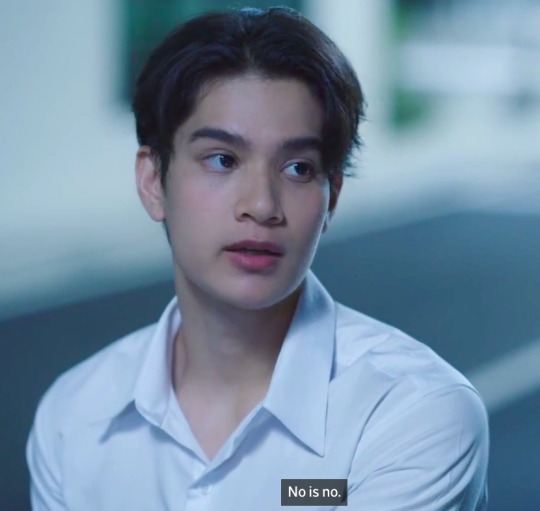
Kiyoi in My Beautiful Man, TeaKyung in Light on Me, Bank in Golden Blood, Nampu in Top Secret Together, Jin in Nitiman, Nut in My Boy, Kaitoon in Love Area, Pob in Don’t Say No, and Kaow in Brothers all represented for ukes in strongly uke/seme driven stories who still had a ton of agency. This was usually expressed as a desire to emotionally communicate with their semes, verbally or physically. Also, they all showed a certain amount of self awareness, self acceptance, and self understanding around being gay as a result. Occasionally tho, they just punched their idiot seme. And that was fun too.
Also shout out to Note & Ta (no uke/seme dynamic) in The Yearbook who got very little screen time but might be the best gay communicators we’ve ever seen in a BL.
You go boys!
6. BL X3 - The Dreaded Love Triangle /_\

BL has always had faen fatals but love triangles, not so much. (Japan’s 2008 Taiikukan Baby is the only one I have on record). A true love triangle just means the story, screen time, and the visual tropes treat both possible love interests as entirely viable and possible.
Gen Y the series - side dishes Thaunu’s seme with 2 ukes love triangle, pretty unique actually
Top Secret Together - part of the friends to lovers side plot
Light on Me - the cherry on the love triangle Sunday
Love Area - the second lead syndrome was fierce with this one
The Tasty Florida - edged into it but mostly was using the faen fatal
My Mate Match - cohabitation quarantine project
Kieta Hatsukoi AKA Vanishing My First Love - started out with each person liking the wrong other person, circular love triangle M2F2M2M, but sorted it fast
I’m A Fool For - Hong Kong’s little offering (sad)
Love With Benefits - cohabitation quarantine project
I don’t like love triangles but even I thought Light On Me was excellent. Still I’m not wild about this particular trend (and I wonder if it’s a Kdrama side effect), but it sure was fun to watch all the different countries tackle it and Japan’s take (Kieta Hatsukoi) was really unique and clever.
7. Do I Spot Actual Queer Rep?

Honest queer rep has started to show up more (FINALLY). Everything from out gay main characters (please may this be the death of gay-for-you) to the rise of the gay advice dad (HIStory 4, Be Love In House, Top Secret Together, Love is Science?) to mention of (and implied use of) actual lube.
It used to be so rare to see any BL characters in leading roles who identified as gay (outside of Taiwan). Now it’s almost - dare I say it? - commonplace. Or if not common in the leads, at least some of the support cast will code/identify as gay.
Thailand put an out gay IRL actor couple together on screen and stopped caring about pushing a gay-for-you agenda. They seem to be at the hand-wavy stage of “you can believe he’s bi, GFY, or gay, we don’t care to define it anymore.” They even directly addressed it as problematic in Bad Buddy. They also had more out gay mains than ever before (explicit or not), a pansexual in Don’t Say No, and TharnType got on screen married. Thai BL still punches down on femme and trans characters, but a little flame is leaking in whether they like it or not (side eyes My Boy), and that aspect is fabulous. OF COURSE IT IS.
Taiwan gave us tons of actually queer stuff, Papa & Daddy, See You After Quarantine, Light, Love Is Science. As well as depicting a marriage of equality actually on the screen in a BL (to be fair they did that first with Craving You in 2020). They also depicted discussions about verse, topping/bottoming, safe sex, consent, and surrounding queer fam. Even Pride showed up. Taiwan leans into masculine presenting, weak seme/uke couples, which means their femme and gender fluid rep is poor but I still gotta give them credit for the equality agenda they are pushing on a very willing audience. Give us MOAR, we can take it!

Vietnam got in on the action and gave us a cross dressing gay main character with out gay besties working in a cafe and running an accidental long con on their boss, who consequently has the shortest bisexual identity crisis ever. Watch My Lascivious Boss, it’s groundbreaking BL - we haven’t had anything like it since I am Your King (Thailand 2017) or Udagawachou de Matteteyo (2015) and neither of those were this happy. Also Vietnam repped butch GLs in high school! (Stupid Boys Stupid Love). Which I think is an actual first. We’ve had lesbians before but butch? SO GOOD.
Even Korea gave us an out bisexual in Tasty Florida AND crossdressed for BL. I stil can’t get over Nobleman Ryu’s Wedding. I mean it wasn’t even played for laughs, it was genuine and treated gracefully... by Korea. Can you BELIEVE we got that? And more is coming in 2022.
I know these seem like baby steps in the west but trust me these are big-ass murder-walk stiletto strides being taken.
(Also tiny shout out to Korea’s The King’s Affection, the first time I’ve seen one of the ubiquitous “girl disguises herself as a boy” historicals actually deal openly and honestly with a bisexual identity crisis and acceptance. And now... how many of us now want Rowoon to do BL? Pretty much all of us.)
PRODUCTION TRENDS
8. BL Takes to the Skies

Wellp, BL discovered drone tech this year. We saw a number of BLs employ drone work rather ruthlessly. China in WoH, of course, but also Taiwan and Thailand used drones in some of their stuff. Close Friend was the most startlingly egregious, but you know, boys with toys.
What can you do?
9. BL Gets Up in Your Face
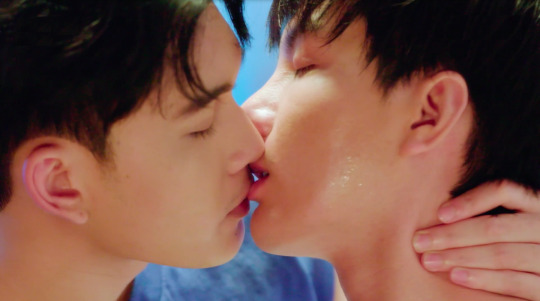
On the flip side, I think the wild success of ITSAY last year impacted taste in close filming style that we haven’t seen much of in Thailand before now. Nitiman, Hometown Embrace, Second Chance, Golden Blood, and Y-Destiny all zoomed in crazy close on faces. More than I’ve ever seen the Thai pulps do before. Let’s be frank, I wouldn’t trust the Thai makeup crew either. But it was Yearbook that really forced me to notice this trend.
Full frame faces is a popular indie filming stye for encouraging claustrophobic-intimacy and emotional tension in drama, and I don’t mind it in limited doses (Japan & Taiwan) but I’m not wild about a lot in one drama or extensively in one scene.
Like drone work, it can be easily overdone and makes me stop thinking about the story and start thinking about the directing. And I am one of those who believes that in BL, I shouldn’t be getting distracted by technique.
Speaking of technique...
10. BL Forgets its Roots

Finally (and sadly for me) there wasn’t much use of yaoi style (live action manga) framing and staging techniques. Possibly because there were so few manga adaptations. Color Rush hit it out of the park, Light One Me put its own blue/white twist on the clarity of this style, and, of course, Given was on point. But that was about it.
There were tiny nods from H4 and the end of year stuff from Japan, but apart from that, it seems like this is a stye of staging and framing has had its heyday.
It also demonstrates that no one storyboards anymore.
*insert whimpering here*
POSSIBLE 2022 TRENDS?
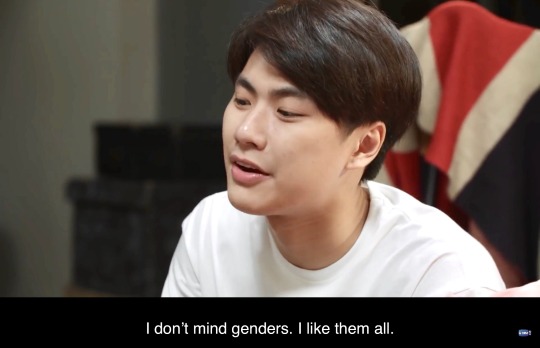
I expect most of the above to be amped up and continue in 2022. In fact, as I type this queer rep already got a major boost in Episode 9 of Bad Buddy (which is from heavy hitter GMMTV, notoriously slow to evolve), by directly addressing and correcting for
gay for you
wifey language
inadequate GL rep
If felt a lot like GMMTV was trying to correct for SOTUS’s mistakes. How far they have come in 5 short years. Honestly, I have to say a lot of this is probubly due to global reach and international popularity and the active interactions of the fandom.
Tears & Blood

I think we are going to see a spike in dark BL from Taiwan, Japan, and Thailand maybe even Vietnam - gritty pretend realism with sad & amorphous endings, heavy illness content (AKA the cancer mom stories), violence, and even kink. It’s going to take the guise of mafia and if we are lucky boys-in-uniform, (possibly sports), but also youthful more serious trials with family and illness. Think Your Name Engraved Herein style content with lower production values.
Taiwan and Japan have always dabbled in this kind of BL (see 2021′s Light & Pornographer series) but they are going to start to really push (subconsciously) to distinguish themselves from Korea with grittiness. Both might even lean more into heavily queer affirming stuff as Japan finally tilts towards marriage equality (which goes hand in hand with realism - code for darker content).
Thailand, on the other hand, is producing so much content, each new BL with gumption is going to look for ways to distinguish itself from all the other Thai BLs, so I think we might see the pulps lean darker, or at least wistfully sad. As disappointing as I found The Yearbook, Seven Project, and The Best Story I think they might herald a trend.*
* I wrote this before GMMTV announced its 2022 line up and now I feel terribly chuffed with myself.

I have a data analysis post where I go into growth numbers and statistical trends here.
BL 2021 STATS & TRENDS BY COUNTRY
(source)
#asian bl#thai bl#korean bl#k-bl#vietnamese bl#taiwanese bl#japanese bl#chinese bl#adapted from a manga#live action yaoi#film predictions#film industry#asian film#tv trends#long post#trending#love triangles#romance tropes#romance trends#bl predictions#up coming bl#bl news#film trends#kdrama#upcoming bl#end of year wrap up
94 notes
·
View notes
Text
The psychological paradoxes of Utsukushii Kare, part 1: Covert grandiosity and finding status through idealization
I’ve had some thoughts about Utsukushii Kare bouncing around in my head since the end of season 2. I started to post about them back then but my first attempts stalled out. Maybe the ideas involved were too complex, or I just needed to let them marinate a bit longer. I tried to give up on getting them on “paper,” but they just wouldn’t leave me alone. Eventually I returned to them and everything clicked. This is part one of my attempt to get those ideas down. After a ridiculous amount of tinkering, it seems like the right time to let it see the light of day. Subsequent posts are in different stages of readiness as well.
I wouldn’t have finished this without copious encouragement and feedback from @lurkingshan and specific edits from @wen-kexing-apologist. A kind comment from @nieves-de-sugui was a shot in the arm. And I’m always indebted to @porridgefeast for support, encouragement, and cute animal content.
I’ve written a lot about this series in the past; refer to my Utsukare master post for a continuously updated list. This includes some related posts on pursuer/distancer dynamics and attachment style in the series that have some overlap with what I’m discussing here, but this post should also stand on its own quite well.
A few things to note at the outset:
My focus here is on the series (both seasons), but I will refer to the movie, the novel, and a couple of vignettes when they illustrate points that are consistent with and relevant to the series.
My approach in this series of posts involves viewing fictional characters the way I would if they were real people--a bit like if I were to do a case conceptualization of a potential client. This isn’t always the approach I use, or the best one, but I thought it was a good fit for what I wanted to discuss here.
Quotes will be cited, but general information on sources will be given at the end of the post.
Now, to get down to business.
* * * * * * *
I’ve seen a lot of commentary from other Utsukare fans about Hira and Kiyoi and how much their self-worth–and the lack thereof–impacts their relationship. It’s a clear theme and lots of folks have had salient insights about it. But one thing I haven’t seen in any of the posts I’ve read is a full acknowledgement of the duality at play there–the way that both characters sometimes believe, or at least fear, that they’re irredeemably awful and at the same time believe, or perhaps hope, that they are better than everyone else.
I’m sure someone reading this is thinking, “Kiyoi is like that, sure. But Hira? Thinking he’s superior? Come on.” I get that it isn’t always apparent. In a genre that loves to portray profoundly smitten, devoted characters, Hira stands out as intensely, even excessively, whipped. But yes, Hira totally sees himself as superior to others in some important ways. Even before Noguchi Hiromi took his inventory about this so mercilessly, there were plenty of other signs.
covert grandiosity and idealization
Our introduction to Hira is his description of the “pyramid” social structure he experiences at school and how he’s at the lowest level of that pyramid (invisible at best, a visible target at worst). At first glance, this seems self-deprecating. But Hira is just describing where he falls in the structure, not endorsing the structure or his place in it. This sets up an important distinction that comes up continually in Hira’s thinking. Sometimes he really thinks badly of himself. But other times, he’s reporting how, in his view at least, others think of him. Sometimes he’s resigned to the ways others see him, but other times, he rebels against them. He doesn’t always make it clear which of these things he’s doing at a given time, but if you know what to look for it starts to be easier to pick out.
Mind you, it’s still very clear that there are ways in which Hira does view himself extremely negatively. His belief that he’s unworthy of Kiyoi is particularly strong. It inspires a lot of demeaning metaphors about himself, like calling himself a “pebble.” His belief in his unworthiness is linked to the belief that Kiyoi can’t possibly return his feelings or that if he does, it’s a bizarre miracle that can’t possibly last over the long term. The most remarkable thing about this belief is its incredible persistence, even in the face of example after example of evidence that Kiyoi loves and values him too and wants them to stay together. But denigrating himself in this context has a different meaning from what it would in others, as I'll get into in more detail shortly.
It’s a pretty universal human tendency to pay more attention to information that confirms our biases than information that challenges them. We’re also hard-wired to be more attentive to perceived threats (including threats to our sense of self-worth) than we are to less threatening things (and ideas). Both of these tendencies contribute to the fact that most of us fail to notice when our negative beliefs are being disproven.
I’ll be discussing this in more depth in part 2, but for now, I’ll just say that resistance to disproving a negative belief is very normal, but Hira’s stubbornness is way beyond what’s typical. He continually misinterprets or simply ignores clear signs of Kiyoi’s interest in and regard for him. I mean, most of us, no matter how poor our self-esteem is, no matter how jaded and pessimistic we are, would, if kissed by someone we’re in love with, at least entertain the possibility that they might like us a little bit. Not only does Hira not consider this possibility, he comes up with the rather bizarre interpretation that the graduation day kiss was Kiyoi’s way of telling him to leave him alone.
So, why would anyone be as stubbornly negative on this point as Hira is? Part of it is the strength of his negative beliefs and the degree of his bias. But there’s another reason as well, one I’m going to circle back to in a moment.
First, let’s look at Noguchi’s assessment of Hira in season 2, episode 4, which is very pertinent here. Talking about Hira’s submission to the Young Photographica contest, Noguchi says:
It was such a childish photo. You should've just chosen an empty place rather than erasing people. Going out of your way to [erase] people made it very clear that you hate this world. What I felt from your photo was tremendous selfishness and disgust. You haven't succeeded at all, but you think you're amazing. But instead of showing it outright, you make a shell by belittling yourself. You look down on this world with youth, stupidity, and ambiguity….You're just like the old me.
(dialogue from Viki subtitles)
It’s a little bit of a stretch, I think, to suggest that Noguchi can really tell all of this just by looking at a single photo (or even Hira’s entire portfolio). I think this partly happens just for the convenience of the story. But if I had to justify it, I’d say Noguchi has this much insight because, as he says, he used to be like Hira, making this a “takes one to know one” situation.
Hira confirms that Noguchi is correct here. “It’s like he sees right through me,” he thinks. So how do we reconcile this with Hira’s apparent negative self-image? Well, first off, it’s not unusual at all for very negative and excessively positive beliefs about the self to coexist in the same person. Take narcissism for example. People tend to think of narcissists as grandiose, thinking they’re amazing and special to a degree that’s clearly distorted. And that is one of the key symptoms of narcissism. But it’s also typical for narcissists to believe that if they aren’t remarkably special, they’re totally worthless. They have a hard time sitting with moderate (hence realistic) beliefs about themselves.
This kind of narcissistic tendency is really strong in people with Narcissistic Personality Disorder, but it’s present in a milder version in a lot of people (I suspect it’s present in most people, to some extent and under certain circumstances). Narcissistic personality traits are supposed to be linked to getting stuck at a developmental stage that ideally gets worked through during childhood. But a lot of us have at least a little bit of unfinished business from that period. I think Hira has a ton of unresolved stuff in this area. I definitely don’t think he would meet criteria for NPD. But I think that when he was in that developmental stage, he came up with some maladaptive strategies that helped him to get through it. As a result, he didn’t get stuck in the full-blown grandiose version of NPD, but he did get stuck with those maladaptive strategies, and they became a part of his personality instead. And he did retain 1) some of that highly polarized idea of self-worth (“I’m either the best ever or complete garbage”) and 2) some degree of belief in his superiority to others, no matter how shameful he finds it or how carefully he conceals it.
It’s also worth noting here that adolescents aren’t typically supposed to be diagnosed with personality disorders and even diagnosing young adults is often discouraged. This is because adolescence and early adulthood are times of intense change and development and the natural process of maturing can cause personality disorder symptoms to resolve even without mental health treatment. So that’s yet another reason to be wary of labeling Hira with any such diagnosis. This points to a major theme of the show, which is the fact that the central characters are works in progress. They aren’t fully formed adults yet, and that gives them a chance to improve themselves before they become set in their ways.
Getting back to Noguchi’s points: Hira is pretty misanthropic, although it’s often shown in pretty subtle ways in the show. This aspect of Hira is more noticeable in the novel. For one thing, the novel establishes early on that the erasing-people-from-photos thing isn’t some new or isolated phenomenon. Rather, the main thing Hira does with his camera at the beginning of the story is to intentionally take photos of populated areas and then carefully photoshopping out all of the people. And it’s explicitly because he dislikes, even hates, most of humanity. This tendency still comes through in the series. Sometimes it’s obvious–remember those mass shooting fantasies?--and other times, it’s more subtle. We know that this aspect of the character is definitely still present in the series version of Hira since he confirms what Noguchi says about how his photo shows “selfishness and disgust.” He really is disgusted by many of the people around him.
making a shell - perfectionism and covert grandiosity
What about the part of Noguchi’s spiel where he says that Hira “make[s] a shell by belittling [himself]?” It took me some thinking to realize what (in my view) he meant by that.
This actually syncs up really well with something Noguchi says about Hira in Utsukushii Kare: Eternal. It’s illuminating enough that I’m making an exception here to confining myself to the time period of the series.
In this scene, Kiyoi is scheduled to be photographed by Noguchi on a day that Hira isn’t present at his studio. He asks about Hira and he and Noguchi talk about him briefly. Hearing that Kiyoi was Hira’s high school classmate, Noguchi talks about how weird and confining high school is, a terrible “environment for growth.” He says that doesn’t apply to Hira, though, because he’s “a king in sheep’s clothing.” This catches Kiyoi’s attention. “I was just thinking that you understand him really well,” he tells Noguchi. “I do,” Noguchi replies. “Although he looks timid and weak, he’s actually really strong.”
As Noguchi continues, his comments become more metaphorical and get harder to understand. (I suspect that the metaphors he uses might be idiomatic or otherwise intelligible to a Japanese audience in a way that’s difficult to get across in translation.) The gist is that he sees Hira as “strong-minded,” but that “in his heart” he has a kind of “sanctuary” that he protects from others, and that this could end up either holding Hira back or being something he can use to get somewhere in life. I’m not sure what to make of the sanctuary part, but it’s clear that Noguchi understands that Hira has thoughts and emotions that he doesn’t share with anyone, and that his image as a “sheep” who is “timid and weak” masks an unseen strength and determination, along with a more king-like attitude toward the world than he typically shows to others.
Time for a quick psychological theory sidebar, this time on perfectionism.
Some researchers who study perfectionism have identified a type they call “narcissistic perfectionism.” Narcissistic perfectionists think that they are, or need to be, perfect, and they expect others to be the same way, thinking about them in highly negative ways if they don’t measure up. If you read about this idea, most of the examples given to illustrate it are people who have achieved a lot in their lives, who can point to big accomplishments. But perfectionism doesn’t always result in achievements. Sometimes it keeps people stuck in a mindset that anything but perfection is pointless, making them reluctant to really try to do anything at all. If you’re a perfectionist who has a need to believe you’re special, that you would achieve big things if you tried, actually trying means taking a risk that you’ll find out that when you try, the results aren’t actually perfect and amazing.
According to narcissistic thinking, this would mean that you’re worthless, because the options are either being the best or being complete garbage. Again, I think it’s an overstatement and an oversimplification to call Hira a narcissist, but he has unresolved self-worth baggage that takes a somewhat narcissistic shape. In this way, he shows a kind of perfectionism that seems clearly underpinned by his self-worth issues. Instead of fueling achievements, this perfectionism keeps him stuck, inactive, too afraid to attempt what he thinks he might be able to do while clinging to a fantasy of what he could do if he ever got un-stuck and really tried.
That’s usually a secret. Remember when Hira didn’t make it through the first cut of the contest? He thought, “Even though I always deny it out loud, I did think photography was the one thing I can do. It felt like I was being ripped apart for being conceited" (dialogue from a fansub by @lollipopsub). The fact that he would "deny it out loud" is notable. I also think that he’s still not being entirely candid. If he thought “photography was the one thing [he] can do,” that wouldn’t exactly be “conceited”--it would actually be quite modest (about photography) and harshly self-critical (about everything else). I think deep down he has thoughts that are truly conceited, thoughts that he’s not just competent when it comes to photography, but “amazing,” as Noguchi puts it. Once again, Hira confirms everything Noguchi said with his “he sees right through me” reaction, so he agrees with this assessment.
This conceited side of Hira is never supposed to see the light of day. This is the main reason he’s so intensely embarrassed when Noguchi understands him so well, I think. It’s what Noguchi is talking about when he says that Hira “make[s] a shell by belittling [him]self.” Acting as if he’s the lowest of the low is a defense. It does correspond to the part of himself that fears, at times even believes, that he’s worthless. But it’s also a way of hiding his grandiose side. This is a way of protecting himself from the reaction others would have if they could see how highly he thinks of himself despite not having made enough effort to accomplish the sorts of things he thinks he’s capable of. It’s also a way of protecting himself from his own awareness of his shortcomings and pretensions.
There’s another type of perfectionism researchers have identified, called “covert perfectionism,” in which the person’s outward expectations of others are low and they don’t show their perfectionistic traits outwardly very much, if at all. They’re supposed to be more likely than some types to get trapped in the kind of stuckness I mentioned earlier, in which perfectionism prevents the person from making a real effort at things they would like to do well. In some important ways, Hira’s perfectionism resembles this type as well. You could say that his type of perfectionism has definite narcissistic attributes, but he hides it well enough that it is also covert.
A number of different articles on perfectionism that I looked at cited the same Brene Brown quote about it, from her book The Gifts of Imperfection. I think it’s very salient here. She writes:
Perfectionism is a self-destructive and addictive belief system that fuels this primary thought: If I look perfect, and do everything perfectly, I can avoid or minimize the painful feelings of shame, judgment, and blame.
This is very characteristic of Hira. He doesn’t expect to “look perfect” in most respects (he’s more likely to simply try to go unnoticed). But he is obsessed with avoiding those painful emotions. He has spent his entire life being shamed and judged and living in fear of it happening still more. He’s very strategic and has given a lot of thought to how best to avoid being shamed. In fact, these efforts seem to be part of the reason he is such an avid observer of the social structures around him–learning about those structures is a survival skill for him.
idealization and affiliation: borrowing status
In addition to factoring in his covert grandiosity, I think there’s something else to account for when looking closely at Hira’s apparent self-hatred. Hira’s self-critical tendencies can appear inflated if we lump examples that pertain to his relationship with Kiyoi in with other cases. They should actually be looked at separately, because their meanings are distinctly different. Again, I don’t contest that Hira has a low opinion of himself in a lot of respects. But I think when we step back and look at many of the biggest examples of what appears to be a negative view of himself, a lot of them are focused on where he stands in relation to Kiyoi. That’s not the same thing as his value as a person. And placing himself in a certain role in relation to Kiyoi has a specific kind of meaning for him, along with a specific kind of payoff.
Here comes another theoretical interlude. This time, I’m going to briefly touch on Heinz Kohut’s idea of the need for idealization.
Kohut was the originator of a school of thought called self psychology, a branch of psychoanalysis that underpins a lot of contemporary psychoanalytic/psychodynamic theory and practice. He was also an expert on narcissism and basically saw variations and degrees of narcissism as central to a lot of psychological challenges. (There’s some reason to believe Kohut may himself have had narcissistic personality disorder, which would have made him intimately familiar with its inner workings.)
Kohut’s self psychology departed from Freud’s whole psychosexual development model (basically, everyone’s least favorite aspect of Freudianism—the part with all the penis envy and Oedipal stuff and so forth). In its place, self psychology focuses on how we see ourselves, what our needs are in terms of self-image, and other matters that are very relevant to this discussion. One of Kohut’s most important insights was his observation that even when other people have a big impact on our psychological state, what we’re interacting with isn’t so much the other person themselves but our internalized idea of that person. Kohut called internalized versions of people and things from our external world “selfobjects.” (I’ll be circling back to this momentarily.)
One of Kohut’s most central concepts is idealization. In Kohut’s version of idealization, a person views someone else as basically perfect, maybe even omnipotent. The idealized person becomes a special kind of selfobject. In the best case scenario, the person doing the idealizing has some kind of real, personal connection to the idealized person. But even a mental connection to them via their status as a selfobject can meet a need in some ways.
By feeling connected to, or even just affiliated with, the idealized person, the idealizer feels like they take on some degree of the qualities they see in the idealized person. It’s not hard to see how this tendency would date back to childhood. Children have a particular need to idealize their parents at certain stages in their development. Thinking of their parents as strong, capable, in control, wise, calm, etc. gives children a sense of safety and a sort of borrowed self-esteem.
Once you’ve idealized someone, you feel a real need to continue to see them as special and powerful. Again, childrens’ views of their parents are a good example here. One reason children often blame themselves when they are neglected or abused is because they have a strong need to continue to view their parents favorably. Without that favorable view of their parent, their world would seem chaotic and dangerous. Blaming themselves often seems safer. Here, maintaining the high status of the idealized person is so important that it’s a bigger priority than preserving self-worth.
I bet you can guess where I’m going with this. Yep, Hira idealizes Kiyoi in the Kohutian sense of the word. There are a number of facets of this. Part of it involves viewing Kiyoi as basically perfect–outstanding in every way. Even when Hira sees Kiyoi as cruel, he seems to view this as an ideal attribute for someone like Kiyoi.
Hira not only states that he thinks of Kiyoi as “like a God" in season 1, episode 6, he frequently expects Kiyoi to have god-like qualities and abilities. In one of Nagira Yuu's shorter pieces about Hira and Kiyoi that's told from Hira's perspective, he's explicit about this. "Kiyoi's existence is already in a much higher dimension than human beings," he thinks. "Is he the successful fusion of deity and human? That is the big question" ("Wonderful World," as translated by @sparkling-rain). At points during the series, he expects Kiyoi to have a superhuman degree of freedom to do anything he wishes and to know things that would require him to read Hira's mind. He really does treat him as if he’s practically omnipotent.
Hira's idealization of Kiyoi has a number of implications. One is that Hira misunderstands the social structure at his school. He views Kiyoi as the unquestioned king and doesn’t see that in many ways, Kiyoi makes choices about how to behave in school out of a desire to stay on the good side of bullies like Shirota. This fundamental misunderstanding in turn makes it impossible for Hira to notice or understand all the ways Kiyoi tries to protect him at school. If Kiyoi were really at the peak of the school hierarchy, if he wanted to be nice to Hira, he would just do it. But because he has to maintain a certain image in order to keep himself safe, he has to help Hira in covert ways. For example, when Kiyoi admonishes Yoshida not to order Hira around or use his demeaning, ableist nickname, he makes it seem like he just wants Hira to be at his beck and call, which wouldn’t be possible if he were occupied doing tasks for others. But if that were the case, why would he object to Yoshida using the nickname? For that matter, why doesn’t Kiyoi ever use the nickname himself? (He says it aloud in his exchange with Yoshida, but he never actually uses it to address Hira.) If Hira weren’t so invested in the idea of Kiyoi’s supreme power, he might have noticed these disparities between his narrative and reality within the story.
In season 2, the fact that Hira is both someone who has a relationship with Kiyoi and at the same time is a fan of Kiyoi as a performer points out another aspect of idealization. While I’ve never seen Kohut’s concept of idealization applied to fandom, I think there’s at least a variation of it at play when we feel comforted by, or as if we gain status from, being a fan of a person (or a group, piece of media, etc.) that we see as special or powerful. When we get excited because the sports team we root for does well or our favorite actor wins an award or is in a movie or show that does well, I think we’re experiencing a kind of gratification based on a selfobject that we feel is ideal in some way. Our status as fans gives us an affiliation that feels similar to a real connection. (Parasocial relationships are related to this as well–something that’s likely to resonate with those of us who participate in BL fandom, where examples of parasocial relationships abound.)
So both as a fan and as a classmate, then a (sort of) friend, then a boyfriend, Hira gets a great deal of satisfaction and happiness from idealizing Kiyoi and feeling like he has a kind of tie to him. This is completely interwoven with the love he feels for Kiyoi in the beginning. But it also makes it very difficult for him to acknowledge the ways in which Kiyoi doesn’t actually resemble his initial, idealized selfobject of him. Kiyoi isn’t omnipotent. He was never actually the most powerful person in their high school class. In many ways, he’s actually a better person than his selfobject version. Although Kiyoi isn’t the nicest person ever, he’s not nearly as cruel as the cold, imperious figure Hira paints him as.
Sometimes Hira chooses this selfobject over Kiyoi the human being, and Kiyoi knows it. In season 1, episode 4, when Hira starts to get close to Kiyoi but then backs off, protesting that he’s just a “servant” and Kiyoi is his “king,” Kiyoi responds by telling him (in the Viki subtitle translation), “I don’t care if you chase your ideal of me, but leave the real me alone.” This dynamic, of course, is a huge theme in their relationship that continues all the way to the end of season 2 and beyond.
Those are some of the ways in which Hira insists on maintaining his idealized selfobject of Kiyoi. But there’s another way he clings to this idealization, which I think is harder to see at first: in order for Kiyoi to be elevated, Hira has to be beneath him. This is actually one of the most paradoxical parts of this paradoxical structure, because in Hira’s view, he has to be beneath Kiyoi in order for Kiyoi to be exalted, but by exalting Kiyoi, Hira’s status is raised. It sounds strange at first, but it’s not a new idea. The notion of humbly dedicating oneself to someone or something that you uphold as an ideal sounds like an act of self-abnegation, but in the minds of those who take on such a role, by affiliating themselves with this perfect person or thing, some of the magical aura of that perfection rubs off on them.
It’s a bit like members of the clergy in the past (in a Christian/European context), who were known to humble themselves completely, taking vows of poverty, depriving themselves in various ways, even mortifying their flesh. Through these humbling acts, these people were seen by themselves and others as closer to God than an ordinary person, potentially as a channel to God–even as someone who could actually speak for God. By humbling themselves and exalting their ideal, they became something greater than they would ever have been capable of being on their own. Hira’s approach is remarkably similar. In keeping with his description of Kiyoi as a kind of god, he talks about wanting to be a “nun.” (As I understand it, he’s describing a role more like that of a shrine maiden in Shintoism than a nun in any Christian tradition, but there’s enough similarity in those roles to justify the translation.) Basically, if you make your ideal person perfect enough, then even being their servant gives you a lot of status, especially if you’re their most devoted, indispensable servant.
I’m reminded of a passage from the novel here. In the novel version of the story, Kiyoi visits Hira at his new home. A different situation than the one in the series has led to him living alone for the first time, and as in the series, Kiyoi uses his need for a rehearsal space as an excuse to visit Hira there. The situation is somewhat different from the series, but similar in essentials. Hira and Kiyoi have a conversation that leads to an exchange that is equivalent to the conversation that takes place right after the finger incident in the series. In the novel, this scene is portrayed from Kiyoi’s point of view; anything in italics is his internal dialogue. (The ellipsis below is mine.)
‘What am I to you?’
‘The person I love most in the word.’
It was this firm response that gave Kiyoi courage.
‘Then, do you want to date me?’
Kiyoi felt his face burning. Just say yes. If you do, I’ll be able to be honest too. Kiyoi’s heart was pounding as he waited for Hira’s answer, but the answer he got was something that he hadn’t expected.
‘I don’t want to.’
Kiyoi blinked.
‘Why?’
…
‘Because you’re the king.’
‘Huh?’
Kiyoi’s eyes blinked even faster than before.
‘I mean…Kiyoi is like a king, and I’m merely an ordinary person who serves the king; it’s not like I do it out of obligation, but in my mind, I view myself as Captain Duck…Ah, by Captain Duck, I’m referring to a yellow toy in the shape of a duck that children play with in swimming pools or bathtubs, you know?’
–I know, but what does that have to do with it?
Not caring about Kiyoi, who wanted to ask something, Hira continued to explain about the duck. He kept babbling on and on about how Captain Duck once used to float in the sewage and was now proudly floating down a golden river as a prestigious toy of the king, and it was very satisfied with its current life.
(from this section of White Lotus’s novel translation)
Hira is explicit here about the servant/king relationship he envisions for himself and Kiyoi. But the rubber duck imagery is even more telling. Being a cheap toy, an inanimate object of so little value that it’s almost disposable, is more than enough for Hira as long as he can be associated with Kiyoi–if he can be ‘a prestigious toy of the king.’ Just belonging to Kiyoi, even (or especially?) as an insignificant object, equates to ‘proudly floating down a golden river.’ Again, placing Kiyoi in an exalted position and then abasing himself (while maintaining a link to Kiyoi) is Hira’s way of using idealization to achieve a paradoxical kind of status.
The conflict over Hira’s unrelenting idealization of Kiyoi comes to a head in season 2 when Hira fails to understand why his comment about Kiyoi and his parents having “nothing to do with one another” was hurtful.
Kiyoi: Do you not get how I feel right now?
Hira: I don’t!
Kiyoi: Think about it! If you don’t get it, think! [tapping Hira on the head]
Hira: Sorry.
Kiyoi: I don’t want you to apologize.
Hira: But…you’re mad at me.
Kiyoi: It’s always like this. I get mad, and you take the blame. But in reality you just don’t get it!
Hira: No, I don’t! The stars in the sky and the ones watching them will never align!
Kiyoi: What does space have to do with it?!
Hira: Because you and I are completely different! We’re in different dimensions and on different paths. That’s why stars shine so brightly! If I try to touch it or to understand it, all I’ll do is pull the star down to my level! So what I’m saying is…in reality…I don’t…want to understand you.
(dialogue translated by @lollipopsub)
Hira makes this dynamic very explicit here. It’s not just that he thinks Kiyoi is superior and his role is to serve him. He’s determined to actively resist interacting with Kiyoi on an even playing field. It’s particularly clear when he says, “If I try to touch it or to understand it, all I’ll do is pull the star down to my level.” Seeing things from Kiyoi’s point of view or touching him–metaphorically, and in some ways literally–would “pull [Kiyoi] down to [Hira’s] level.” Instead of raising Hira’s status, this would degrade Kiyoi’s. The distance between Kiyoi and Hira–the lack of understanding and meaningful contact–is (from Hira’s perspective) a feature, not a bug. It’s integral to the gratification Hira experiences when he watches Kiyoi as if he were a star–something both beautiful and trillions of miles away.
One sign of the importance Hira places on Kiyoi’s exalted social status is how irritated, even livid, he gets when other people don’t recognize and behave in accordance with his views on the social hierarchy and where they stand in relation to Kiyoi.
For example, when Shirota and his friends make shitty comments about Kiyoi after he doesn’t win the contest, they’re obviously being assholes. But what bothers Hira most is that they are acting as if Kiyoi failing to win a highly competitive national contest means he’s beneath them, when in fact, it’s unlikely any of them would have qualified as contestants, much less made it to the finals like Kiyoi did. To Hira, it’s their lack of understanding of their place in the hierarchy, their lack of recognition that Kiyoi is above them, that is most damning. Which is legitimately infuriating–they’re being incredibly arrogant. But personally, I think it’s clearly more important that they’re being critical and dismissive of someone they claim is their friend right when he has just gone through something very disappointing. That’s not a big concern for Hira, though. In addition to deriving a kind of status from his association with Kiyoi, he also finds some satisfaction in knowing that while his status in relation to Kiyoi is low, at least he can correctly gauge where he stands, unlike others.
And he seems to relish not only correctly assessing his place in the world but also maintaining a particularly lowly role. This isn’t inherent to idealization, though as I’ll talk about further, this combination of factors isn’t unique to Hira by any stretch. I mentioned that Hira’s perfectionism, among other things, is a way of attempting to, as Brene Brown put it, “avoid or minimize the painful feelings of shame, judgment, and blame.” Hira does have some grandiose beliefs about himself, but he also views himself as inferior in many ways. This tension creates the stuckness that often comes with perfectionism, and this blocks Hira from attaining goals that would fuel a more healthy kind of self-esteem. Gaining status through his association with an idealized version of Kiyoi gets around all of these problems.
Hira also seems to view his grandiose thoughts as a sort of jinx, a way of tempting fate. Think back again to his thoughts when he found out that he hadn’t made the first cut in the Young Photographica contest. “It felt like I was being ripped apart for being conceited.” In Hira’s world, having grandiose thoughts–or at least, buying into them–brings punishment. It’s better, and safer, to embrace total abjection. This is one more reason why it seems safest to put Kiyoi on a pedestal while placing himself in the most inferior position possible. At least, this seems safest until Hira realizes he could lose Kiyoi entirely if he doesn’t stop this destructive pattern.
When Hira does finally try to make a shift in how he relates to Kiyoi at the end of season 2, the big gesture he makes toward “look[ing] at [Kiyoi] straight on” is setting, then communicating, the goal of photographing Kiyoi in the role of professional photographer. This is a very appropriate way for him to make this move. Viewing Kiyoi more as an equal means having to relinquish some part of the status and self-worth he borrows from his idealized image of Kiyoi; this is the perfect time, then, for him to find some self-worth of his own by finally putting himself out there as a photographer and making a real effort to test his abilities.
That's it for this installment! I hope to get part 2 posted within the next week. Edited to add, four months later: That was a little unrealistic! But I'm determined to finish it off one of these days.
Edited to add:
Adding an edit here as I noticed what seems like a rather glaring omission. I failed to reference a scene that bears out a lot of what I have to say in this post. It happens when Hira is staying with Noguchi in Eternal. They have this exchange over ramen:
Noguchi: I was just like you in the past. All full of myself and thought that everything I saw was boring. I was always angry and all, "You're all worthless and should disappear!"
Hira: I don't think we're alike at all, though.
Noguchi: Having too much confidence and having too little confidence, they're two sides of the same paper in the sense that they're both signs of a damaged self-consciousness. Anything could make you switch sides at the drop of a hat.
(Emphasis mine.)
Citations for individual quotes are included with their respective quotes. The following sources were used:
When I quoted series dialogue, I used the wording @lollipopsub used in their (sadly no longer accessible in the US) fansub whenever possible. I lost access to this version so these quotes are from my notes.
I also quoted the Viki subs (which are good, just not quite as good as the ones @lollipopsub made) when needed. On one occasion I used the Viki version because it supported my point better.
When I quoted the novel, I quoted a fan translation by White Lotus featured on a site called Chrysanthemum Garden.
I also briefly quoted a short story translated by @sparkling-rain here.
When I quoted Eternal, I quoted a fansub that (at the subber’s request) will remain nameless.
#utsukushii kare#utsukare#utsukushii kare meta#utsukushii kare analysis#utsukushii kare season 1#utsukushii kare season 2#utsukushii kare 2#utsukushii kare eternal#my beautiful man#hira x kiyoi#psychology of bl#self psychology#heinz kohut#selfobject#covert perfectionism#narcissistic perfectionism#psychological paradoxes of utsukushii kare#hira kazunari
77 notes
·
View notes